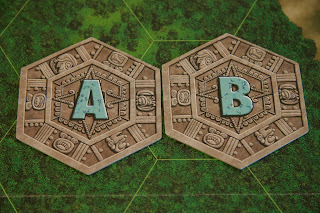Tikal won the game of the year way back in 1999. To me it is still one of the best games out there and in need of a new edition so more people will get a chance to experience the wonder of Tikal. Players are on jungle expedition in Tikal and must try to uncover the most impressive ruins and treasures.
Objective: Your objective is to be the player with the most victory points when the last scoring round ends.
Scoring Rounds: Every time a volcano is drawn there is a scoring round, and there is one final scoring round after the last hex tile is drawn and that player’s turn is over.
Game Play: Even though many mechanics in Tikal can be found in games today playing it still feels unique. Every turn you must draw and place a tile, you are then allotted 10 action points and how you spend them will determine how many points you score when a volcano is drawn.
Different Actions:
Place a Man: Placing a man onto the board either at the starting expedition entrance or at a tent you constructed costs 1 action point. Note that placing your ‘leader’ or ‘big guy’ still only costs 1 point.
Move a Man: You can only move between hexes if there are ‘movement stones’ visible, the cost to move is 1 action point for every 1 movement stone.
 |
| Moving from the left hex into the current hex would cost 5 action points, while moving into the hex on the right would only cost 1. |
Dig a Temple: Digging at a temple will uncover more ruins thus increasing its value by 1, digging at a temple costs 2 action points and may be done multiple times each turn. With every dig action you place a Temple Tile with a value one higher than the previous one on top of the temple/previous
Temple Tiles.
Temple Tiles.
 |
| The 5 on the temple tile is placed ontop of the 4 for 2 action points. |
Dig for Treasure: Digging on a hex containing treasure will cost 3 action points. You can do this multiple times per turn, each hex has a limited supply of treasures and they are drawn at random. Note that you are trying to collect matching sets of treasures to increase their value.
 |
| Getting 1 treasure will award 1 point, two of a kind scores 3 points and 3 of a kind scores 6 points! |
Construct a Tent: Building a tent allows you another entry point to get more men onto the board. This costs 5 action points and can only be built in an empty Jungle hex, or a Treasure hex that is empty. You may not build on Volcanoes and Temple hexes.
 |
| You must have a man in the appropriate hex in order to construct a tent. |
Force a Trade: You can force another player to trade treasures with you, pairs and triples cannot be broken but the player cannot refuse the trade, this costs 3 action points.
Place a Guard: You can, if you have the majority of men in the temple hex, place a guard onto a temple. This freezes the temple in its current state under your control. It will never leave your control, it may not be increased in value and your man may never leave. In addition any of your leftover men on the temple hex are returned to the box and you may not re add them to the board for the remainder of the game.
 |
| Placing a guard insures that you will score points for that temple, you cannot increase the value of a temple once a guard has been placed. |
Scoring:
When a volcano is drawn the player halts their turn and everyone immediately totals their points. Also, after the last tile is drawn and the player finishes their final turn, there is a final scoring round.
Scoring Temples: If you have the majority of men on a temple hex, you score points equal to the number on the temple.
Scoring Treasures: For each single treasure you own, you will score one point. For each double you own, you will score 3 points. For each triple you own, you will score 6 points.
Components:
For a game from 1999 the components are great, fiddly but you notice it more when you are setting up, rather than when you are actually playing. Having to stack the temple tiles is the only real nuisance, the treasures are not too bad, and everything just feels a little too small. The map hex tiles are great though, good quality and not overly busy.
Who would enjoy Tikal?
Casual Gamers: This really depends on how casual your group is, for people who don’t mind a bit of a longer more strategic game every now and then it would fit. Lots of the time the length of the game is only increased due to over analyzing, more casual gamers are likely to just finish their turn, make a decision and not try to find the best possible outcome on every turn.
Gamer Gamers: Tikal is a great strategic game, you are trying to spend your 10 action points most efficiently every turn while at the same time trick, pressure and invade your opponents. Add in the extra pressure of not knowing when a scoring round will hit and you have a fantastic deep game for gamers.





Very Nice review, well explained! Better than the rulebook!
ReplyDelete